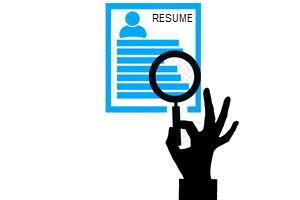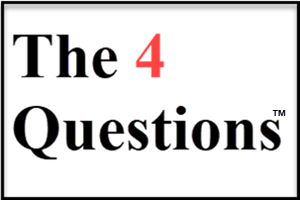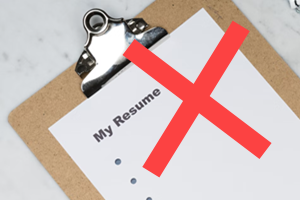How to Get A Job Workshop
In the first installments of this special How to Get A Job series we discussed the pitfalls of resumes, how to get the right job by pursuing fewer jobs, and how to turn people you don’t know into personal contacts that get you in the door. In last week’s Comments section, readers “filled in the blanks,” discussing how to turn new contacts into meetings with managers that might want to hire you. So, then what? Get the inside track before your next interview! — Nick
How to Get A Job: Get the inside track

You may have heard me say this before. Never give your resume to a manager that you haven’t already had substantive contact with. If you do, you cannot stand out when it counts — before the manager starts interviewing your competition.
You may also have heard me say this. If you lost out on the last job to someone that had the inside track, next time be the candidate on the inside track!
So, you’ve put to work the ideas we’ve already discussed in this series. You’ve been referred to a hiring manager (or other influential insider) by someone who recognizes that you may be able to bring value to the operation. This personal introduction is worth far more than any job application or “professionally written resume.” A manager is far more likely to act on a referral from a trusted source than on an unknown applicant.
Then what?
In psychology, a job interview is what we call a cognitive script. The questions and answers — even the behavior and how people dress — are preordained. (If you could be any animal, what animal would you be? What’s your greatest weakness? Where do you see yourself in five years? I call these the Top Ten Stupid Interview Questions.)
Now what do you do? You break the script and stand out.
Break the script
Almost every job-interview story line follows a conventional script. The process, the questions, the sweaty palms, the tricks, the clever comebacks — it’s all a kind of acting. Everyone acts a part.
This makes every job applicant like every other. The sameness is baked into the interview script everyone uses.
This is why, after a day of interviews, the hiring manager can’t distinguish Candidate 1 from Candidate 8. You can’t get hired because you don’t stand out. You’re like an extra in a B movie whose ending you already know.
To get anywhere, you must stand out.
Get the inside track
The best thing you can do to stand out as more than just another job candidate is to break the script. Get the manager out of the same-old Q&A story. (What’s your greatest strength? Why are manhole covers round?) Do something your competition wouldn’t dare. Turn your conversation into something else — a discussion about the work. And start this new script before you even get a job interview!
Please get this straight. What we’re about to discuss is not what to say in a job interview. You must talk to the manager before you apply for the job.
This is what to say to a hiring manager even before they have seen your resume. How you handle this discussion can determine whether you earn a job interview as the candidate with the inside track.
How to Say It
Readers often tell me they understand what I’m recommending they should do, but they don’t know how to actually say it. So let’s run through some of your options, in “how to say it” format.
Now that a new contact has referred you to a manager you need to talk with, call (don’t e-mail or text) the manager. These suggestions may be used as alternatives to one another, or they may be woven together any way you wish to suit your style and approach. This is all about introducing yourself to the manager without a resume.
How to Say It #1
“I’ve been talking with so-and-so and so-and-so [people the manager knows] and they’ve pointed out to me that your operation is growing. They thought I might be helpful to you. Please correct me if I’m wrong, but I understand that two key problems or challenges that you are facing may be these…[briefly describe].”
If you approach a manager with an arrogant or presumptuous tone, they will blow you off. If you approach by saying, “So-and-so suggested that I give you a call,” that opens up the door. Always ask permission to continue.
How to Say It #2
“Thanks to some advice from so-and-so, I’ve been trying to study your business and I’d like to ask if you could give me a little more insight into where your business is going and where you might need some help.”
If you feel awkward and don’t want to come off as presumptuous, turn the discussion away from sounding like a pitch for a job.
How to Say It #3
“I have an interest in your industry. I’m not sending out resumes because I’m not applying for jobs, but people regard your company is a shining light in its industry. I’d like to learn more about [marketing, engineering, etc.] in your company, perhaps about your own department’s needs and about what you do before I apply for a job.”
If you’ve done your homework and spoken with insiders, you have three or four names to drop. Most managers will not ignore personal referrals, even if they don’t have an open job right now. More important, those people that referred you also tutored you in the manager’s business just enough that you’ve been able to formulate some good questions for a productive conversation.
Here’s a potent way to show the manager that you’re the one taking a risk.
How to Say It #4
“I don’t like applying for any job until I have learned enough to be able to go into the interview and demonstrate, hands down, how I can specifically contribute to the bottom line. If I can’t flesh out a plan, I wouldn’t expect any manager to interview me. I’m trying to develop that kind of understanding.”
Don’t ask for a meeting yet. Don’t hog the call. Be brief. Do not recite your resume or credentials! Let the manager talk. Whatever the manager might share with you, ask for a meeting shorter than any job interview; short enough that the manager may actually squeeze you in.
How to Say It #5
“Would you have fifteen minutes for me to stop by so I can get a little more insight about your operation, and about the work you hire people to do? I know you’re busy. I’ll be gone after fifteen minutes.”
Not many managers get phone calls like that. You’re clearly not asking for a job interview.
If you really want to be bold, try this.
How to Say It #6
“Look, I know you might think that I’m coming to you from out of left field, and if I seem like a know-it-all, please pardon me. So-and-so and so-and-so were kind enough to educate me about your company’s business. I’ve spent quite a bit of time trying to get a sense of how I might be able to contribute something to your operation. I’ve put together a very brief business plan I’d like to show you.”
(In the next edition, we’ll discuss how to create this “business plan for a job” that you can use both in your preliminary talk with the hiring manager and in your job interview.)
There’s another version of this you might like better. Can you see the powerful spin on it?
How to Say It #7
“It’s a fifteen-minute presentation. If you’ve got fifteen minutes for me, I’d like to come by your office. If after five minutes you don’t like what I have to say, stop me and I’ll leave, no questions asked. I’m not here to waste your time, I’m here because so-and-so suggested I speak with you — and because I think I can help you. But in any case, I won’t take more than fifteen minutes of your time. Promise.”
If you cobble together an approach from these suggestions, and a manager blows you off, it’s probably not a place you want to work. That’s not sour grapes. A manager who has time only for scripted interviews with people unknown isn’t a good business person.
Talk with the hiring manager before you apply for a job
To establish yourself as worthy of a manager’s interest, you must completely bypass the conventional recruiting and interview script. You must stand out from all other candidates. You must earn the inside edge by earning referrals and tutoring from people the manager knows and trusts.
There is no resume. There is no interview. The opportunity before you is driven by who knows you. Someone the manager knows. It’s driven by talking shop outside the job hunting and hiring script we all know and hate.
This is the substantive contact you need, and you should create it well before any job interview. This is your new script for talking about an opportunity, and these are some suggestions for how to say it.
How would you re-cast my suggested “how to say its” for your own use? Does this give you any other ideas about how to gain an edge over your competition, and how to position yourself? Does it make sense that, to stand out, you must do something “stand-0ut” before you apply for a job or go to a job interview?
: :
 No, it’s not normal. A headhunter could legitimately “chip in” part of his fee to help you offset your relocation expenses, but this kind of payment can also be construed as a kickback unless it is disclosed to, and approved by, the employer.
No, it’s not normal. A headhunter could legitimately “chip in” part of his fee to help you offset your relocation expenses, but this kind of payment can also be construed as a kickback unless it is disclosed to, and approved by, the employer.



 I understand your husband’s hesitation and his attitude, because I was a new college grad once. However, he is absolutely, positively, completely wrong.
I understand your husband’s hesitation and his attitude, because I was a new college grad once. However, he is absolutely, positively, completely wrong.
 I’m inclined to agree with you. You’re not the only frustrated, befuddled job seeker. I get lots of mail like yours. People with solid credentials and experience — at entry and higher levels — are confused and angry.
I’m inclined to agree with you. You’re not the only frustrated, befuddled job seeker. I get lots of mail like yours. People with solid credentials and experience — at entry and higher levels — are confused and angry.
 You have two responsibilities to your employer in this matter:
You have two responsibilities to your employer in this matter:




 Every survey ever done shows that the single most successful path to a new job is personal contacts. Yet, time and again people complain to me that they just don’t know anybody who can help them gain entry to a particular company.
Every survey ever done shows that the single most successful path to a new job is personal contacts. Yet, time and again people complain to me that they just don’t know anybody who can help them gain entry to a particular company.
 “That just showed up in my inbox,” a subscriber wrote me. “Sigh… who needs your advice when I can apply for hundreds of jobs with just one click?”
“That just showed up in my inbox,” a subscriber wrote me. “Sigh… who needs your advice when I can apply for hundreds of jobs with just one click?”
 The first step on your job search is to become aware of the myths of job hunting. The first myth is that your resume will get you in the door for a job interview.
The first step on your job search is to become aware of the myths of job hunting. The first myth is that your resume will get you in the door for a job interview.
 Nice to hear from a “headhunter,” but I’m more concerned about what a candidate should do when you won’t disclose your client. Why on earth would you not tell a candidate who your client is? Aren’t you proud of the client?
Nice to hear from a “headhunter,” but I’m more concerned about what a candidate should do when you won’t disclose your client. Why on earth would you not tell a candidate who your client is? Aren’t you proud of the client?